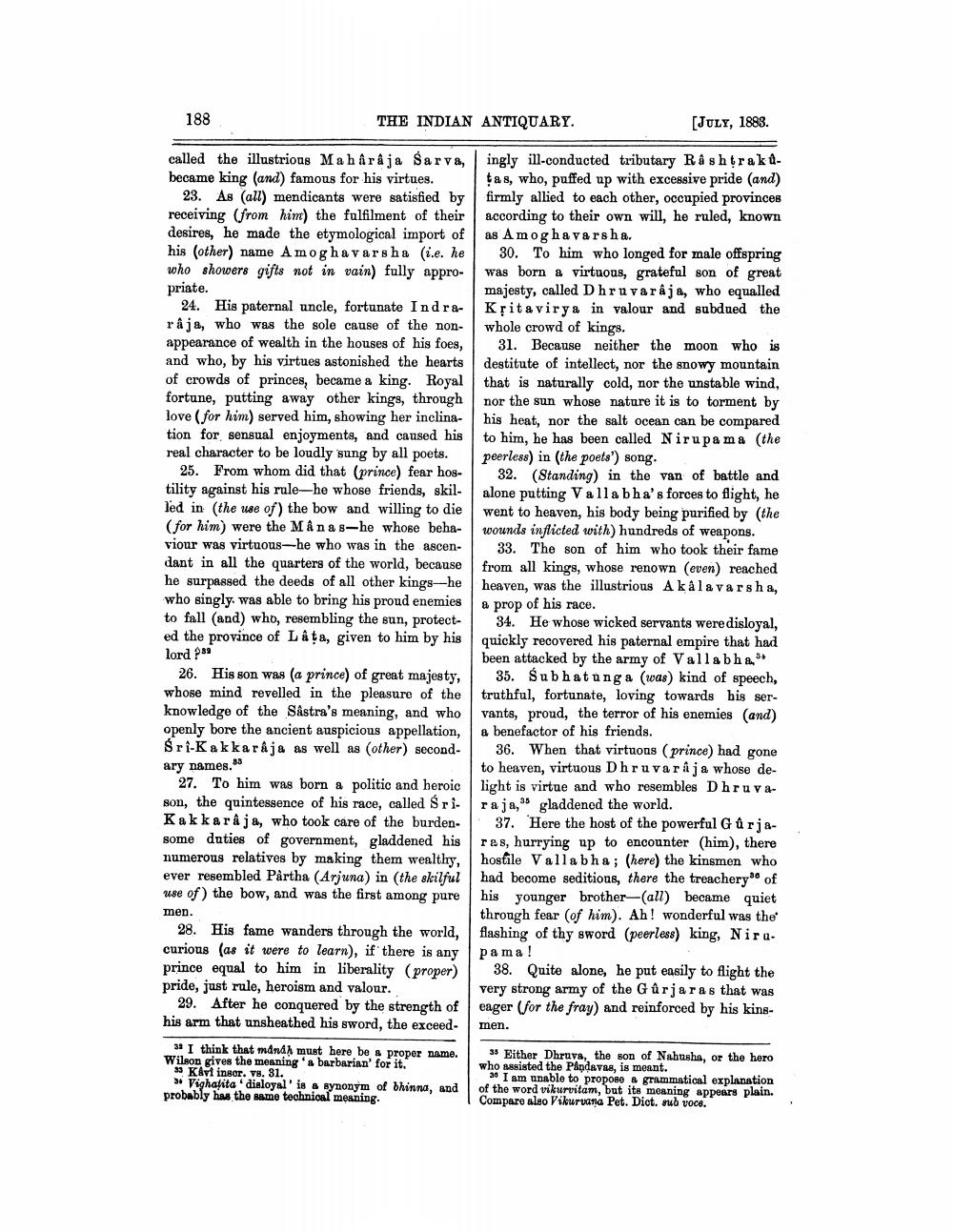________________
188
THE INDIAN ANTIQUARY.
[JULY, 1883.
called the illustrious Maharaja Sarva, became king (and) famous for his virtues.
23. As (all) mendicants were satisfied by receiving (from him) the fulfilment of their desires, he made the etymological import of his (other) name Amoghavarsha (i.e. he who showers gifts not in vain) fully appropriate.
24. His paternal uncle, fortunate Indrerâja, who was the sole cause of the nonappearance of wealth in the houses of his foes, and who, by his virtues astonished the hearts of crowds of princes, became a king. Royal fortune, putting away other kings, through love (for him) served him, showing her inclination for sensual enjoyments, and caused his real character to be loudly sung by all poets.
25. From whom did that (prince) fear hostility against his rule-he whose friends, skil. led in the use of) the bow and willing to die (for him) were the Mâna s-he whole behaviour was virtuous-he who was in the ascendant in all the quarters of the world, because he surpassed the deeds of all other kings--he who singly, was able to bring his proud enemies to fall (and) who, resembling the sun, protected the province of Lata, given to him by his
ingly ill-conducted tributary Rashtrakatas, who, puffed up with excessive pride (and) firmly allied to each other, occupied provinces according to their own will, he ruled, known as Amoghavarsha.
30. To him who longed for male offspring was born a virtuous, grateful son of great majesty, called Dhru varaja, who equalled Kita virya in valour and subdued the whole crowd of kings.
31. Because neither the moon who is destitute of intellect, nor the snowy mountain that is naturally cold, nor the unstable wind, nor the sun whose nature it is to torment by his heat, nor the salt ocean can be compared to him, he has been called Nirupama (the peerless) in (the poets") song.
32. (Standing) in the van of battle and alone putting Vallabha's forces to flight, he went to heaven, his body being purified by the wounds inflicted with) hundreds of weapons.
33. The son of him who took their fame from all kings, whose renown (even) reached heaven, was the illustrious Akala varsha, a prop of his race.
34. He whose wicked servants were disloyal, quickly recovered his paternal empire that had been attacked by the army of Vallabha."
35. śubhatanga (was) kind of speech, truthful, fortunate, loving towards his servants, proud, the terror of his enemies (and) a benefactor of his friends.
36. When that virtuous (prince) had gone to heaven, virtuous Dhruvarija whose delight is virtue and who resembles Dhruvaraja, gladdened the world.
37. Here the host of the powerful Gû rjaras, hurrying up to encounter (him), there hostile Vallabha; (here) the kinsmen who had become seditions, there the treachery of his younger brother-(all) became quiet through fear of him). Ah! wonderful was the flashing of thy sword (peerless) king, Niru. pama!
38. Quite alone, he put easily to flight the very strong army of the Gurjaras that was eager (for the fray) and reinforced by his kinsmen.
lorda
26. His son was (a prince) of great majesty, whose mind revelled in the pleasure of the knowledge of the Sâstra's meaning, and who openly bore the ancient auspicious appellation, Sri-Kakkarája as well as (other) second ary names.
27. To him was born a politic and heroic son, the quintessence of his race, called sri Kakkar å ja, who took care of the burden. some duties of government, gladdened his numerous relatives by making them wealthy, ever resembled Pártha (Arjuna) in the skilful use of the bow, and was the first among pure men.
28. His fame wanders through the world, curious (as it were to learn), if there is any prince equal to him in liberality (proper) pride, just rule, heroism and valour.
29. After he conquered by the strength of his arm that unsheathed his sword, the exceed
* I think that mandmust here be proper name. Wilson gives the meaning 'a barbarian' for it.
33 Kavi insor. vs. 81.
» Vighatita disloyalis & synonym of bhinna, and probably has the same technical meaning.
35 Either Dhruva, the son of Nahusha, or the hero who assisted the Påndavas, is meant.
I am unable to propose s grammatical explanation of the word vikurvitam, but its meaning appears plain. Compare also Vikurvana Pet. Dict. sub voce.




